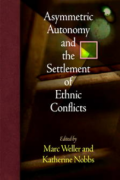Published in Asymmetric Autonomy and the Settlement of Ethnic Conflicts (ed. by Marc Weller and Katherine Nobbs, University of Pennsylvania Press, 2010), this chapter argues that while territorial autonomy is not automatically linked to forms of democratic governance, its success as a conflict settlement strategy has become increasingly connected with the management of ethnic or other forms of cultural diversity in democratic polities and is frequently prescribed as a governance model to countries struggling with diversity management. More often than not, the optimism to resolve self-determination conflicts qua autonomy is derived from two European “model” autonomies — South Tyrol and the Aland Islands.
This chapter begins with an examination of some more general conceptual and empirical issues related to asymmetric territorial autonomy arrangements in pre-1990 Europe to set the stage for the more detailed discussion of South Tyrol and the Aland Islands that follows. The chapter concludes with a brief exploration of the continued relevance of these historical cases of asymmetric territorial autonomy.

